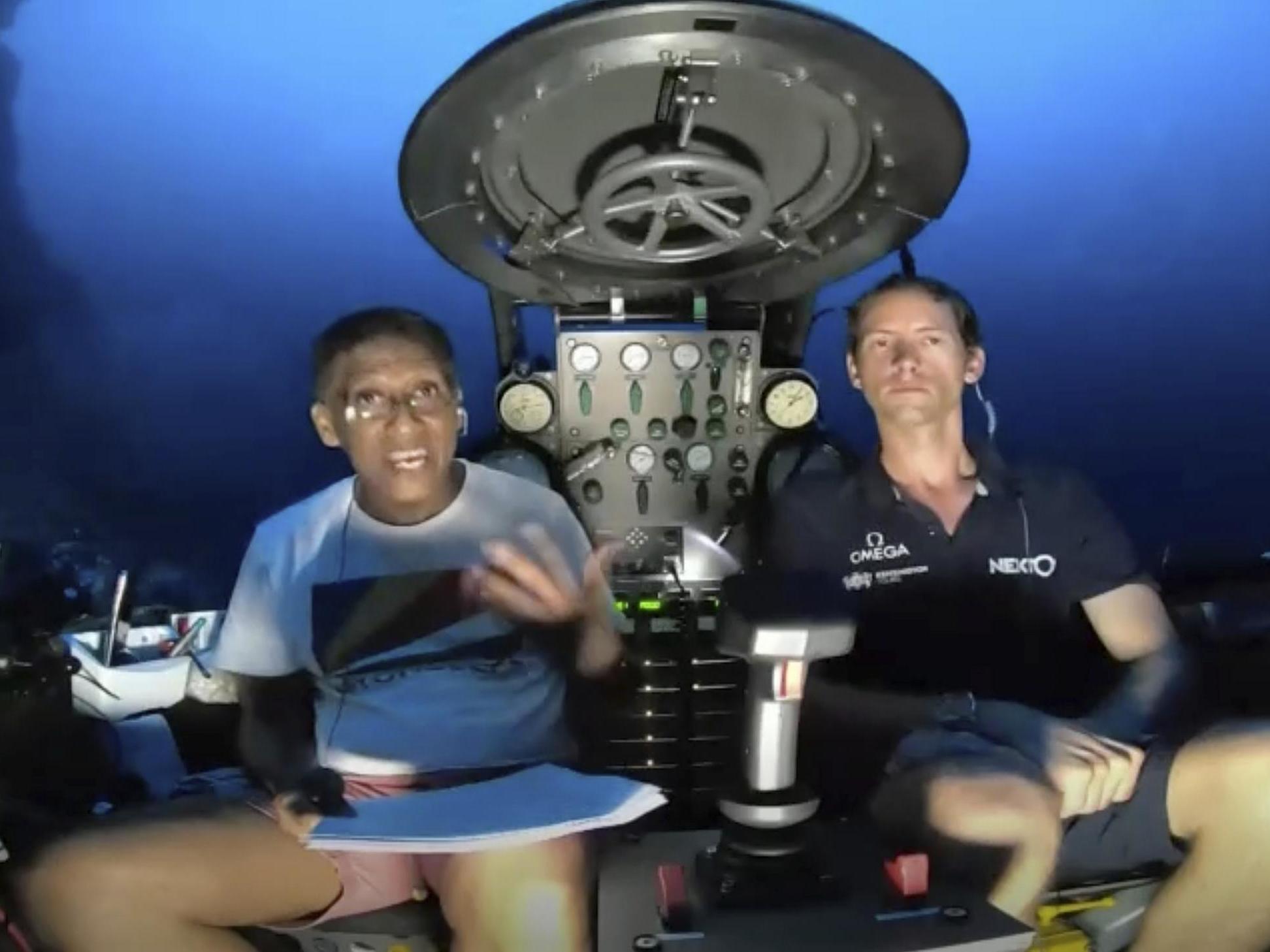Seychelles president issues underwater plea to protect planet’s ‘beating blue heart’
Danny Faure describes visit to British-led submersible expedition 400ft below the waves as ‘so cool’
Deep below the ocean’s surface on Sunday, the president of the Seychelles made a plea for stronger protection of the “beating blue heart of our planet”.
In the first live speech from an underwater submersible, President Danny Faure called for the world to stop polluting seas and for better protection of marine life.
The Seychelles, an archipelago of 115 islands off the east coast of Africa, is one of the many island nations threatened by global warming.
Mr Faure was speaking during a visit to an ambitious British-led science expedition exploring the Indian Ocean from a manned submersible 400ft below the ocean surface.
Oceans cover more than two-thirds of the world’s surface but for the most part remain uncharted. Mr Faure said we have better maps of Mars than we do of the ocean floor.
The president said: “This issue is bigger than all of us, and we cannot wait for the next generation to solve it. We are running out of excuses to not take action, and running out of time.”
Wearing shorts and a T-shirt saying “Seychelles”, the president later said the underwater experience was “so, so cool – what biodiversity”.
He said it made him more determined than ever to speak out for marine protection, adding: “We just need to do what needs to be done. The scientists have spoken.”
The oceans’ role in regulating climate and the threats they face are underestimated by many, even though they generate “half of the oxygen we breathe”, as Mr Faure pointed out.
Scientific missions are crucial in taking stock of underwater ecosystems’ health.
Small island nations are among the most vulnerable to sea level rise caused by climate change. Land erosion, dying coral reefs and the increased frequency of extreme weather events threaten their existence.
In the expedition, University of Oxford scientists have been surveying underwater life, mapping large areas of the sea floor and using underwater drones. Operating as far down as 1,640ft, the scientists have been the first to explore areas of great diversity where sunlight weakens and the deep ocean begins.

By the end of the mission, researchers expect to have collected around 1,400 samples and 16 terabytes of data. They will have surveyed about 25,000 sq meters of seabed, using high-resolution multi-beam sonar equipment.
The data will be used to help the Seychelles expand its policy of protecting almost a third of its national waters by 2020.
The initiative is important for the country’s “blue economy”, an attempt to balance development needs with those of the environment.

“From this depth, I can see the incredible wildlife that needs our protection, and the consequences of damaging this huge ecosystem that has existed for millennia,” Mr Faure said in his speech. “Over the years, we have created these problems. We can solve them.”
Currently, only about 5 per cent of the world’s oceans are protected.
Countries have agreed to increase the area to 10 per cent by 2020.
But experts and environmental campaigners say between 30 per cent and 50 per cent of the oceans outside nations’ territorial waters should be protected to ensure marine biodiversity.
Researchers hope their findings also will inform ongoing UN talks aimed at forging the first high seas conservation treaty, scheduled to conclude this year.
Environmental groups argue an international treaty is urgently needed because climate change, overfishing and efforts to mine the seabed for precious minerals are putting unsustainable pressure on marine life that could have devastating consequences for creatures on land as well.
Oceans will be one of the seven main themes of this year’s UN climate summit in Chile in December.
While scientists are nearing the end of their expedition, their work is just beginning.

In the next few months, they will have to collate and analyse their research. “When we pull them together, we can understand not just what we see in the areas that we’ve visited but what we might expect in other regions in the Seychelles,” said Lucy Woodall, the mission’s chief scientist.
This is the first of half a dozen regions the mission plans to explore before the end of 2022, when scientists will present their research at a summit on the state of the Indian Ocean.
Associated Press
Join our commenting forum
Join thought-provoking conversations, follow other Independent readers and see their replies
Comments
Bookmark popover
Removed from bookmarks